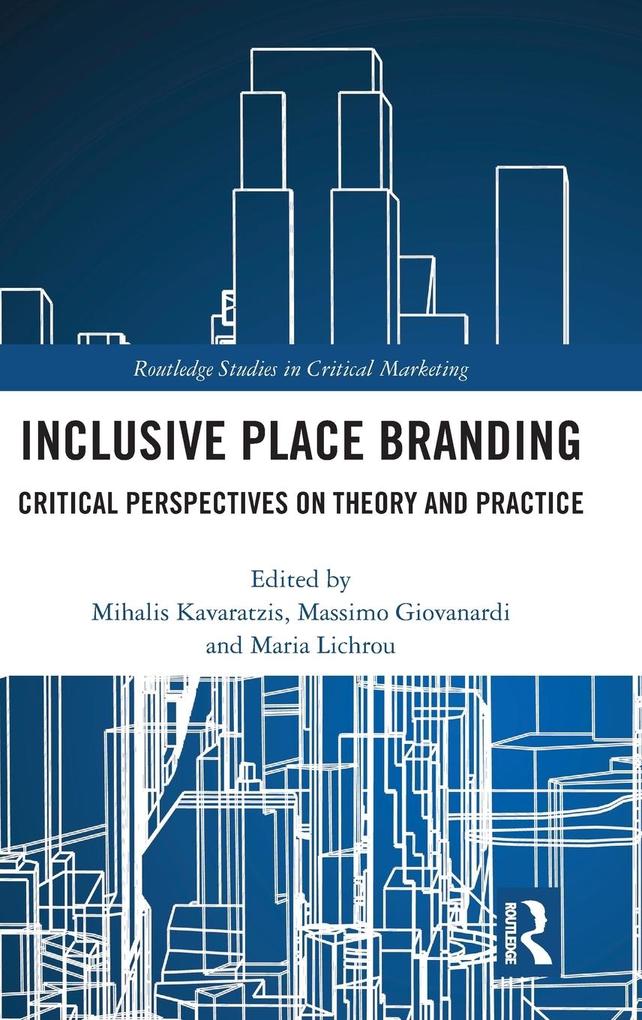
Zustellung: Mi, 30.07. - Sa, 02.08.
Versand in 7 Tagen
VersandkostenfreiBestellen & in Filiale abholen:
Place branding is often a response to inter-place competition, developed in a vacuum, ignoring the needs of local communities and applying quick-fix solutions regardless of geographical and socio-political contexts. The need for more responsible and socially sensitive approaches catering for a wide range of stakeholders, can no longer be ignored.
The contributions in this innovative book introduce new critical ways of thinking around place branding that encourage it to be more inclusive and participatory. It will be of interest to researchers and advanced students of branding, critical marketing, and destination marketing as well as critical tourism and environmental design.
The contributions in this innovative book introduce new critical ways of thinking around place branding that encourage it to be more inclusive and participatory. It will be of interest to researchers and advanced students of branding, critical marketing, and destination marketing as well as critical tourism and environmental design.
Inhaltsverzeichnis
Table of Contents
Notes on contributors
FOREWORD: The politics of event-led urban image construction: notes from Beijing and Rio de Janeiro by Anne-Marie Broudehoux
1. Introduction by Maria Lichrou, Mihalis Kavaratzis and Massimo Giovanardi
2. Democracy in participatory place branding: a critical approach by Eva Maria Jernsand and Helena Kraff
3. Critical perspectives on Aboriginal and Torres Strait Islander tourism: towards Indigenous-led approaches by Skye Akbar and Freya Higgins-Desbiolles
4. Place marketing for social inclusion by Aram Eisenschitz
5. A service ecosystem approach to representing a place's unique brand by Jan Brown
6. Spaces of identity in the city: embracing the contradictions by Cecillia Cassinger and Åsa Thelander
7. Revitalizing the damaged brand: place (re)branding in post-Katrina New Orleans by Kevin Fox Gotham and Katie Irvin
8. Maps and tours as metaphors for conceptualising urban place representation for marketing/branding purposes by Gary Warnaby, Richard Koeck and Dominic Medway
9. Brand conformity in a food place context by Anette Therkelsen
10. Stockholm: the narcissistic capital of Sweden by Johan Gromark
11. A branding stranglehold: the case of Florida's orange tie by Staci M. Zavattaro and Daniel L. Fay
12. Place branding as political research: from hidden agenda to a framework for analysis by Andrea Lucarelli
13 Conclusions: inclusive place branding - towards an integrative research agenda by Massimo Giovanardi, Maria Lichrou and Mihalis Kavaratzis
CLOSING COMMENTARY: between brand utopias and lived experience by Nadia Kaneva
Notes on contributors
FOREWORD: The politics of event-led urban image construction: notes from Beijing and Rio de Janeiro by Anne-Marie Broudehoux
1. Introduction by Maria Lichrou, Mihalis Kavaratzis and Massimo Giovanardi
2. Democracy in participatory place branding: a critical approach by Eva Maria Jernsand and Helena Kraff
3. Critical perspectives on Aboriginal and Torres Strait Islander tourism: towards Indigenous-led approaches by Skye Akbar and Freya Higgins-Desbiolles
4. Place marketing for social inclusion by Aram Eisenschitz
5. A service ecosystem approach to representing a place's unique brand by Jan Brown
6. Spaces of identity in the city: embracing the contradictions by Cecillia Cassinger and Åsa Thelander
7. Revitalizing the damaged brand: place (re)branding in post-Katrina New Orleans by Kevin Fox Gotham and Katie Irvin
8. Maps and tours as metaphors for conceptualising urban place representation for marketing/branding purposes by Gary Warnaby, Richard Koeck and Dominic Medway
9. Brand conformity in a food place context by Anette Therkelsen
10. Stockholm: the narcissistic capital of Sweden by Johan Gromark
11. A branding stranglehold: the case of Florida's orange tie by Staci M. Zavattaro and Daniel L. Fay
12. Place branding as political research: from hidden agenda to a framework for analysis by Andrea Lucarelli
13 Conclusions: inclusive place branding - towards an integrative research agenda by Massimo Giovanardi, Maria Lichrou and Mihalis Kavaratzis
CLOSING COMMENTARY: between brand utopias and lived experience by Nadia Kaneva
Produktdetails
Erscheinungsdatum
30. November 2017
Sprache
englisch
Seitenanzahl
220
Herausgegeben von
Mihalis Karavatzis, Massimo Giovanardi, Maria Lichrou
Verlag/Hersteller
Produktart
gebunden
Gewicht
499 g
Größe (L/B/H)
240/161/17 mm
ISBN
9781138659247
Entdecken Sie mehr
Bewertungen
0 Bewertungen
Es wurden noch keine Bewertungen abgegeben. Schreiben Sie die erste Bewertung zu "Inclusive Place Branding" und helfen Sie damit anderen bei der Kaufentscheidung.










